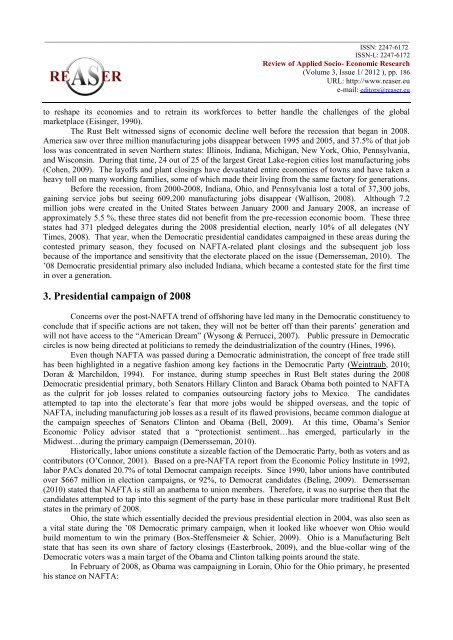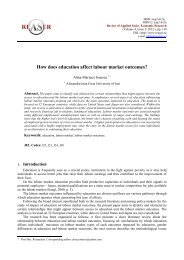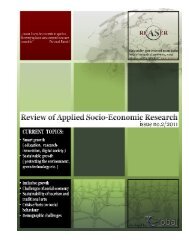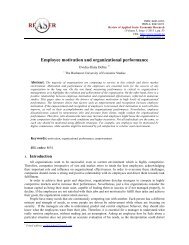Volume 3, ISSUE1/2012 - Review of Applied Socio-Economic ...
Volume 3, ISSUE1/2012 - Review of Applied Socio-Economic ...
Volume 3, ISSUE1/2012 - Review of Applied Socio-Economic ...
Create successful ePaper yourself
Turn your PDF publications into a flip-book with our unique Google optimized e-Paper software.
________________________________________________________________________________________________<br />
ISSN: 2247-6172<br />
ISSN-L: 2247-6172<br />
<strong>Review</strong> <strong>of</strong> <strong>Applied</strong> <strong>Socio</strong>- <strong>Economic</strong> Research<br />
(<strong>Volume</strong> 3, Issue 1/ <strong>2012</strong> ), pp. 186<br />
URL: http://www.reaser.eu<br />
e-mail: editors@reaser.eu<br />
to reshape its economies and to retrain its workforces to better handle the challenges <strong>of</strong> the global<br />
marketplace (Eisinger, 1990).<br />
The Rust Belt witnessed signs <strong>of</strong> economic decline well before the recession that began in 2008.<br />
America saw over three million manufacturing jobs disappear between 1995 and 2005, and 37.5% <strong>of</strong> that job<br />
loss was concentrated in seven Northern states: Illinois, Indiana, Michigan, New York, Ohio, Pennsylvania,<br />
and Wisconsin. During that time, 24 out <strong>of</strong> 25 <strong>of</strong> the largest Great Lake-region cities lost manufacturing jobs<br />
(Cohen, 2009). The lay<strong>of</strong>fs and plant closings have devastated entire economies <strong>of</strong> towns and have taken a<br />
heavy toll on many working families, some <strong>of</strong> which made their living from the same factory for generations.<br />
Before the recession, from 2000-2008, Indiana, Ohio, and Pennsylvania lost a total <strong>of</strong> 37,300 jobs,<br />
gaining service jobs but seeing 609,200 manufacturing jobs disappear (Wallison, 2008). Although 7.2<br />
million jobs were created in the United States between January 2000 and January 2008, an increase <strong>of</strong><br />
approximately 5.5 %, these three states did not benefit from the pre-recession economic boom. These three<br />
states had 371 pledged delegates during the 2008 presidential election, nearly 10% <strong>of</strong> all delegates (NY<br />
Times, 2008). That year, when the Democratic presidential candidates campaigned in these areas during the<br />
contested primary season, they focused on NAFTA-related plant closings and the subsequent job loss<br />
because <strong>of</strong> the importance and sensitivity that the electorate placed on the issue (Demersseman, 2010). The<br />
’08 Democratic presidential primary also included Indiana, which became a contested state for the first time<br />
in over a generation.<br />
3. Presidential campaign <strong>of</strong> 2008<br />
Concerns over the post-NAFTA trend <strong>of</strong> <strong>of</strong>fshoring have led many in the Democratic constituency to<br />
conclude that if specific actions are not taken, they will not be better <strong>of</strong>f than their parents’ generation and<br />
will not have access to the “American Dream” (Wysong & Perrucci, 2007). Public pressure in Democratic<br />
circles is now being directed at politicians to remedy the deindustrialization <strong>of</strong> the country (Hines, 1996).<br />
Even though NAFTA was passed during a Democratic administration, the concept <strong>of</strong> free trade still<br />
has been highlighted in a negative fashion among key factions in the Democratic Party (Weintraub, 2010;<br />
Doran & Marchildon, 1994). For instance, during stump speeches in Rust Belt states during the 2008<br />
Democratic presidential primary, both Senators Hillary Clinton and Barack Obama both pointed to NAFTA<br />
as the culprit for job losses related to companies outsourcing factory jobs to Mexico. The candidates<br />
attempted to tap into the electorate’s fear that more jobs would be shipped overseas, and the topic <strong>of</strong><br />
NAFTA, including manufacturing job losses as a result <strong>of</strong> its flawed provisions, became common dialogue at<br />
the campaign speeches <strong>of</strong> Senators Clinton and Obama (Bell, 2009). At this time, Obama’s Senior<br />
<strong>Economic</strong> Policy advisor stated that a “protectionist sentiment…has emerged, particularly in the<br />
Midwest…during the primary campaign (Demersseman, 2010).<br />
Historically, labor unions constitute a sizeable faction <strong>of</strong> the Democratic Party, both as voters and as<br />
contributors (O’Connor, 2001). Based on a pre-NAFTA report from the <strong>Economic</strong> Policy Institute in 1992,<br />
labor PACs donated 20.7% <strong>of</strong> total Democrat campaign receipts. Since 1990, labor unions have contributed<br />
over $667 million in election campaigns, or 92%, to Democrat candidates (Beling, 2009). Demersseman<br />
(2010) stated that NAFTA is still an anathema to union members. Therefore, it was no surprise then that the<br />
candidates attempted to tap into this segment <strong>of</strong> the party base in these particular more traditional Rust Belt<br />
states in the primary <strong>of</strong> 2008.<br />
Ohio, the state which essentially decided the previous presidential election in 2004, was also seen as<br />
a vital state during the ’08 Democratic primary campaign, when it looked like whoever won Ohio would<br />
build momentum to win the primary (Box-Steffensmeier & Schier, 2009). Ohio is a Manufacturing Belt<br />
state that has seen its own share <strong>of</strong> factory closings (Easterbrook, 2009), and the blue-collar wing <strong>of</strong> the<br />
Democratic voters was a main target <strong>of</strong> the Obama and Clinton talking points around the state.<br />
In February <strong>of</strong> 2008, as Obama was campaigning in Lorain, Ohio for the Ohio primary, he presented<br />
his stance on NAFTA:








